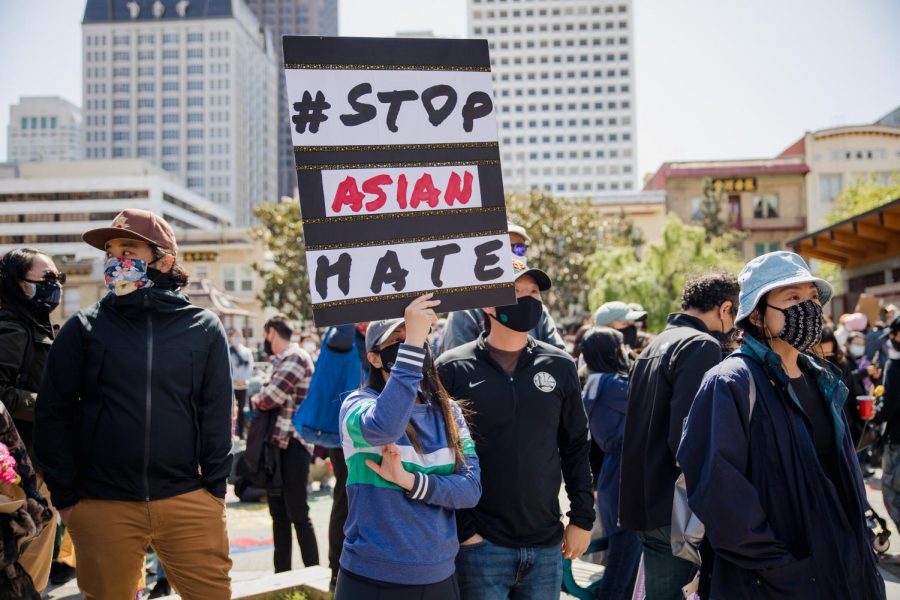Your donation will support the student journalists of The Tide, Richard Montgomery High School's student newspaper. Your contribution will allow us to purchase equipment and cover our annual website hosting costs.
Local efforts rise to combat the surge of anti-Asian American hate crimes
March 22, 2021
Photo Courtesy of Jason Leung via Unsplash
As attacks against Asian Americans have surged during the pandemic, many community gatherings and marches in D.C have been organized to combat these incidents.
Anti-Asian hate crimes have risen by nearly 150 percent amid the COVID-19 pandemic. Attacks against Asian Americans is not the only thing surging; discrimination and xenophobia have also skyrocketed in the past year. However, along with the influx of racist attacks, local efforts like organizing community gatherings and marches in D.C to combat these incidents are growing as well.
Whilst most incidents have occured in major U.S. cities, two Asian American business owners in Montgomery County were targets in February.
The first robbery happened in Wheaton. The victim had her purse stolen from three armed men. A month later, someone had stolen her silver SUV, most likely using the car keys from her stolen purse earlier. In the second incident, a woman was driving home when she was rear-ended by a vehicle. When one suspect pointed a handgun at her, the other went into her car and stole $200. The suspects fled the scene in a silver SUV.
According to investigators, the two separate incidents are connected. Montgomery County police believe the incidents are not racially-motivated, but nonetheless, there has been an unsettling pattern of Asian-owned businesses being attacked since the beginning of COVID-19. Police are advising everyone to be careful and wary of their surroundings, especially Asian American elders.
In Howard County, six businesses were attacked by burglars, four of which were Asian American owned restaurants. These violent robberies have Maryland’s Asian-American community fearful everyday. Although many are not victims of severe hate crimes, almost all have experienced subtle discrimination, racism, and microaggressions due to the pandemic. Some have been called slurs like “Kung Flu” while others were harassed in grocery stores, being yelled at to go back to their country.
“Countless words can be used to aptly describe my feelings towards the recent exponential rise in anti-Asian hate crimes: scared, confused, disappointed in humanity,” Chinese teacher Mrs. Poo said. “I wish to tell the young generation of Asian Americans: you are Americans. This is your home too. Speak up and speak out against racism and hate. Raise your concerns and make your voices heard!”
Recently, the Atlanta spa shootings on March 16 have sparked more discussion about these issues. According to the New York Times, eight people were killed at three different massage businesses in Atlanta and the nearby Cherokee County, six of which were women of Asian descent. Assertions from police that the shooter was not racially motivated was met with great disdain.
In light of this event and numerous other cases of anti-Asian American hate crimes, some in the community have begun rallying and participating in activism. From reposting important issues on their Instagram story to attending protests, students are finding ways to combat racism. Lawmakers addressed hundreds of demonstrators on March 20, demanding justice for the eight people shot dead.
The Victims’ Rights Foundation (VRF), a nonprofit volunteer group based in Montgomery County, launched the Stop Asian Hate Campaign at the beginning of March after the Twitter hashtags “Stop Asian Hate” and “Stop AAPI Hate” rose to prominence. The campaign aims to assist Asian American victims of violence and hate crimes in speaking up for themselves, and has a goal of raising $25,000 to help fund reward money for catching suspects and pay for any medical bills and funeral services if needed.
There have not been as many major attacks in Montgomery County against Asian Americans compared to locations such as New York City, Oakland, and Atlanta. “I’ve only seen one instance on social media, where a group of girls in our area created a TikTok account with some racist words,” freshman Sophia Fang said.
Despite this, VRF member Jay Guan feels there is still a great need for advocacy. “The recent uptick in hate crimes against Asian Americans, coupled with its increasingly violent nature, prompted me to seek avenues to fight back,” Guan said. “We cannot normalize racism and hate speech in our everyday and political discourse. It is up to us, up to all of us, to make racism unacceptable again.”

